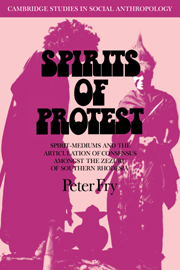 Spirits of Protest
Spirits of Protest Published online by Cambridge University Press: 08 March 2010
Spirit-mediums play many roles but in the main they are concerned with the analysis of extra-ordinary situations, especially ill-health and other misfortunes. The theory on which they draw to make their analyses attempts to explain misfortune in terms of mystical forces set in motion as a result of social disturbance.
As will be shown later in this study, spirit-mediums operate at various levels of social structure, but broadly speaking they can be distinguished as ‘high-level’ mediums and ‘low-level’ mediums. The latter operate at village level and deal with purely local problems, while the former deal with affairs which surpass purely village and lineage interests. However, even village problems are often affected by events which occur outside village limits, and spirit mediums in general have to analyse the extra-ordinary in terms not only of the social structure of Chiota, but of the wider structure of Rhodesia, itself involved in British and world affairs.
Before turning specifically to spirit-mediumship, therefore, it is essential to examine the basic secular characteristics of social life.
Chiota is denominated a ‘Tribal Trust Land’ and it is supposed that there reigns a ‘tribal order’. However, this ‘tribal’ order does not exist simply as a manifestation of the inertia of ‘tradition’, but also as a consequence of diverse political and economic forces. Chiota is not an island. On the contrary, it is very much involved in the wider polity of Rhodesia and the world outside, for its sheer proximity to Salisbury has drawn its people out of the narrow interests of village, kin group and chiefdom, into the economic interests generated by the capitalist structure of the national economy and the political interests generated by the colonial situation.
To save this book to your Kindle, first ensure [email protected] is added to your Approved Personal Document E-mail List under your Personal Document Settings on the Manage Your Content and Devices page of your Amazon account. Then enter the ‘name’ part of your Kindle email address below. Find out more about saving to your Kindle.
Note you can select to save to either the @free.kindle.com or @kindle.com variations. ‘@free.kindle.com’ emails are free but can only be saved to your device when it is connected to wi-fi. ‘@kindle.com’ emails can be delivered even when you are not connected to wi-fi, but note that service fees apply.
Find out more about the Kindle Personal Document Service.
To save content items to your account, please confirm that you agree to abide by our usage policies. If this is the first time you use this feature, you will be asked to authorise Cambridge Core to connect with your account. Find out more about saving content to Dropbox.
To save content items to your account, please confirm that you agree to abide by our usage policies. If this is the first time you use this feature, you will be asked to authorise Cambridge Core to connect with your account. Find out more about saving content to Google Drive.